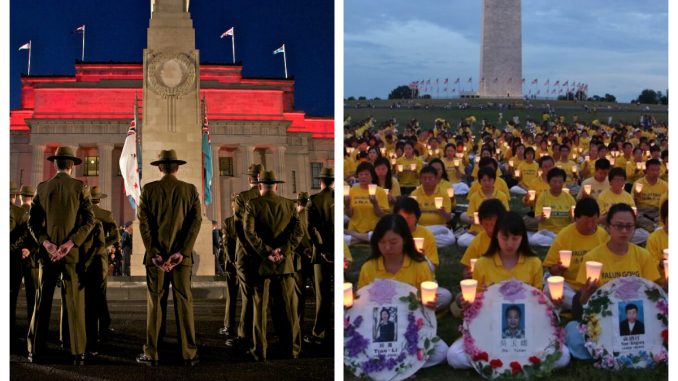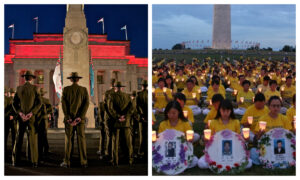

Anzac Day, April 25, remembers the sacrifice of Australian and New Zealand Army Corps soldiers who landed at Gallipoli in 1915, and also commemorates the lives of Australians who died in the Second World War and in other military and peacekeeping operations. It is also an important day in Turkey commemorating the Turkish soldiers who died at Gallipoli.
Since 1999, April 25 was also a significant day for Australians of Chinese heritage and people around the world who practice Falun Dafa.
Falun Dafa, also known as Falun Gong, is a spiritual practice in the Buddhist tradition based on the universal principles of truthfulness, compassion, and forbearance (Zhen, Shan, Ren, in Chinese), and includes self-improvement through the study of moral teachings, gentle exercises, and meditation.
April 25 in Beijing
On 25 April, 1999, over 10,000 Falun Gong practitioners gathered outside the State Council appeals office at the Zhongnanhai compound in Beijing, which also houses the offices of the General Secretary of the Chinese Communist Party and Premier of the People’s Republic of China.
Not since Tiananmen Square in June 1989 had so many Chinese citizens gathered in public to appeal to the government. Chinese Communist Party (CCP) officials often claim this was an organised “siege,” falsely alleging that it posed a threat to the nation’s leaders. Some western governments and media still refer to the CCP’s narrative as a reason that Falun Gong was banned.
However, the gathering was not directed against the government in any way. The practitioners actually went there to request help from the government after fellow practitioners were arrested and beaten by police in Tianjin Municipality.
“The purpose of us going there was quite simple,” Li Yuanhua, a former professor at China’s Capital Normal University and Falun Gong practitioner who attended the gathering and now resides in Australia, told The Epoch Times. ” There was only one purpose. Because I benefited [from the practice] myself … I wanted to tell the government of the positive changes that I experienced—physically, spiritually, all aspects—to tell them that this is a good practice. That’s all.”
Background
Since it was first taught to the public in May 1992 by Mr. Li Hongzhi, Falun Gong was one of many qigong groups registered with the China Qigong Research Association, a government entity. In December 1993 at the Asian Health Expo in Beijing, Li was awarded the “Most Acclaimed Qigong Master,” and in March 1995, Li was invited by a Chinese ambassador to introduce Falun Gong at the Chinese Embassy in France. By 1998, the State Sports Commission estimated that over 70 million people in China were practising Falun Gong.
It was this resurgence of traditional Chinese culture, quashed during the Cultural Revolution, with a focus on health, morality, and honesty, that caused CCP hard-liners like then President Jiang Zemin to look for (or create) reasons to crack down on Falun Gong.
In 1996, Falun Gong books were banned in China and the CCP started disrupting Falun Gong meditation gatherings. Even though government security organisations had investigated Falun Gong and found nothing harmful, sectors of the CCP still used various media to attack Falun Gong.
Precursor to Zhongnanhai Appeal
A magazine in Tianjin, a city south of Beijing, published an article that slandered Falun Gong. Technically, Chinese law and regulations allow the right to request a correction. Falun Gong practitioners in Tianjin went to the magazine to explain the inaccuracies and request a correction. However, the magazine refused. On April 23-24, the Tianjin Public Security Bureau used anti-riot police to hit and disperse the practitioners and arrested more than 40 people. Tianjin police told practitioners that they needed to go to Beijing to solve the problem.
What Happened on 25 April 1999?
By word of mouth, practitioners in Tianjin and Beijing heard this message and went to the State Council appeals office in Beijing. Soon there were over 10,000 people, some standing quietly, some sitting on footpaths around Zhongnanhai. They were careful not to obstruct activities on the streets or footpaths, and did not chant slogans or raise their voices.
Soon, Zhu Rongji, then the Chinese Premier, came out with several staff to meet the practitioners. He asked why they were there, and then called for four practitioners to come inside and meet the Deputy Secretary the Appeals Office.
The four practitioners explained the situation and asked for the Tianjin police to release the detained practitioners; to allow publication of Zhuan Falun (the main text of Falun Dafa), and that they be allowed a fair and lawful environment to practice Falun Gong.
By nightfall, the issues appeared to have been resolved and the practitioners went home. Weeks later, the appeal had been re-interpreted by the CCP as reason to launch a crackdown with the establishment of the 6-10 office (named by its date of creation on June 10, 1999), a Gestapo-like extra-legal organisation to implement the persecution of Falun Gong. It continues today, with thousands killed and hundreds of thousands incarcerated for their beliefs.
Commonality of Spirit
Apart from sharing April 25 as a date of commemoration, there are also shared qualities in the Anzac spirit and the spirit of Falun Dafa practitioners.
The Australian War Memorial website notes that although there was no military victory at Gallipoli, the great courage, endurance, initiative, discipline, and mateship displayed became known as the Anzac spirit. Falun Dafa practitioners have continued to peacefully endure for 21 years, with great courage, compassion, and discipline.
As Australia faces the Chinese Communist Party’s tactics of bullying and manipulation in 2021, remembering the events in Beijing on April 25, 1999, can also guide our response. Stay true to Australia’s traditional values, remain steadfast and determined to peacefully uphold what is right, even amidst threats, coercion, and deceit—and the outcome will be just.
John A. Deller is a committee member of the Falun Dafa Association of Australia. The opinions expressed here are his own.
Views expressed in this article are the opinions of the author and do not necessarily reflect the views of The Epoch Times.






Be the first to comment